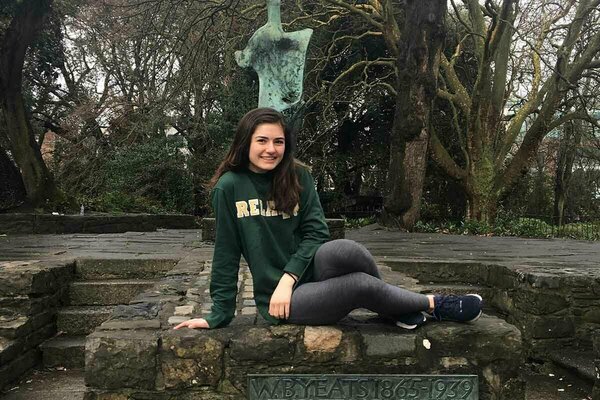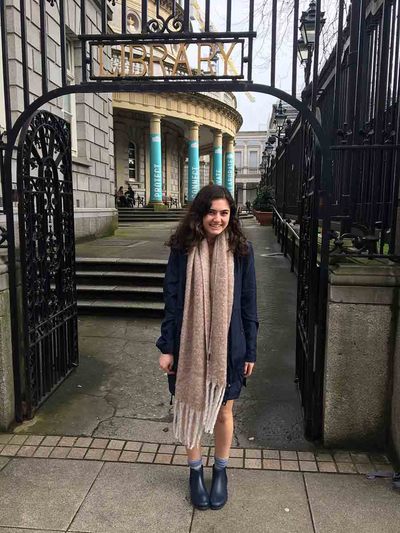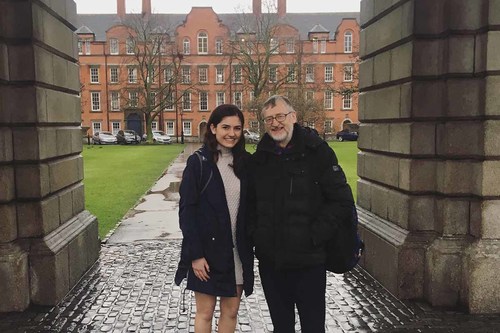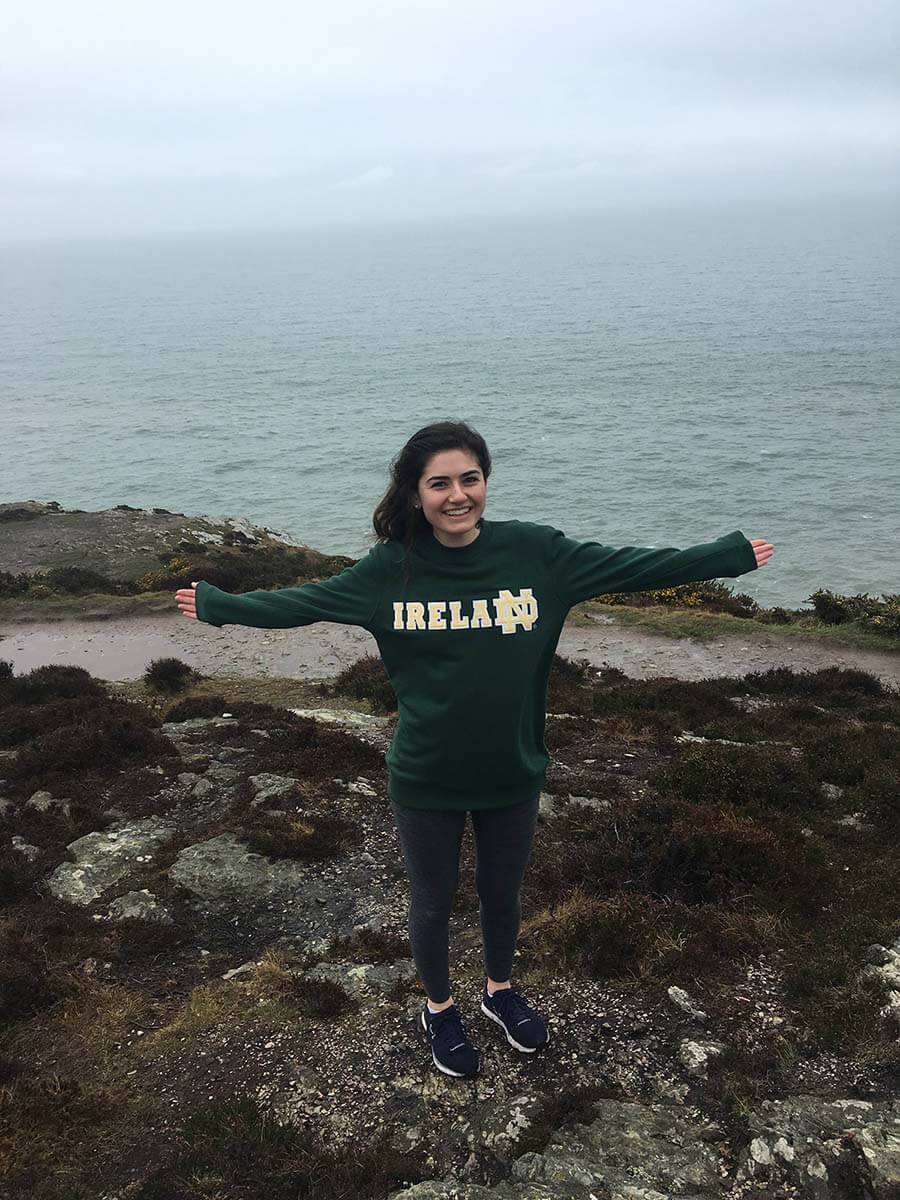
Can poetry be a useful tool for medical doctors? Alexandra Tatarian thinks so. The junior pre-med student has a passion for poetry, and she visited Ireland over Spring Break on a Nanovic Institute travel grant to explore ways to use poetry to share science with the public. While there, she met with physicist-poet Iggy McGovern, and the Irish poet Jane Clarke. She plans to use the insights she gained from these conversations, along with her visit to the National Museum and Library, to craft a submission for the Hippocrates Prize for Poetry and Medicine.
One note I wrote in my journal during the trip says, “I may be the happiest I have ever been. I realize life is about seeing the world and pursuing your passions. For the first time, I am doing just that.”
Finding a Gap
This project was proposed as an interdisciplinary study to challenge me creatively and serve in my career discernment, and it did just that. As a pre-medical student, I love studying science and understanding the world around me, while poetry is my extracurricular passion. Through extensive exploration, I discovered that these two interests are not so different. Poetry can even be a way to shape society through thought and powerful words, and Ireland is an example of a country that was shaped by its poets.
 National Library of Ireland
National Library of Ireland
The “fili” of Celtic Ireland were poets with important documentation roles. In fact, poets in Ireland were oftentimes more commanding leaders than politicians. Since their poetry was so influential, I became determined to find ways poetry and creativity can be used to share science with society, particularly in the medical field.
To do so, I requested funding for travel to Dublin, Ireland over spring break in order to learn more about the history and culture which has laid this foundation. From there, I proposed to meet with physicist-poet Dr. Iggy McGovern at Trinity College Dublin, speak with famous Irish poet Jane Clarke, and visit the National Museum and Library. Each of these activities was intended to provide insight and new information to expand my project while further enabling me to begin work on a piece for the Hippocrates Prize for Poetry and Medicine.
This project was particularly important for me in terms of career discernment and gaining coherence in my academic studies. The decision to attend medical school is enormous, and each semester at Notre Dame brings me closer to it. I enjoy my science coursework and have taken the necessary pre-medical steps so far, including studying for the MCAT, research, and intensive shadowing; however, I have not yet come to a conclusion.
Considering my passion for poetry as well as my broad background resulting from my Science-Business major, I began thinking there can be more to my career than just becoming a doctor. After shadowing, I realized there is a large gap in understanding between doctors and patients as well as communication issues on both sides. As professor Chris Stevens, my project mentor, taught me in Principles of Management, the chance to innovate and become an entrepreneur starts with finding a gap. I then turned to poetry and began evaluating its potential as a platform for creative, improved communication especially in relation to medicine.
Filling the Gap in Ireland
Given its history and current resources, Ireland became the perfect venue for my project. I needed to go there in order to see first-hand how closely tied the country is to its poets and how poetry continues to shape it today.
I experienced the Science Gallery and Book of Kells at Trinity, National Library, National Gallery, National Museum, Howth cliffs, Merrion Square, St. Stephen’s Green, O’Connell Street, Dublin Castle, and St. Patrick’s Day Parade. The Yeats Exhibit elucidated for me how interwoven and influential poetry has been throughout Irish history. This proven power of poetry inspires me to continue pursuing my goal of improving doctor-patient relations through poetry and related means of effective, creative communication.
My phone call with Jane Clarke gave me direction for the next steps of my project and she described poetry as a “distillation” of a subject or idea to its essence. For me, this explanation that poetry can have multiple levels of meaning above a core message demonstrated its power as a means of communication.
 Meeting Dr. Iggy McGovern
Meeting Dr. Iggy McGovern
Then, my meeting with Dr. Iggy McGovern confirmed this role for poetry as he stated that poetry, kept simple, is meant for all. This is an important underlying concept for my project. It was also interesting to hear that his approaches to physics and poetry are independent, but relatively consistent processes. Dr. McGovern was an impressive and sincere individual whom I am so fortunate to have met. He also shared that sometimes science and poetry can be difficult to connect, but that this challenge can be addressed using humor and emphasizing human nature.
Later that day, Dr. McGovern invited me to a presentation by Irish poet Eiléan Ní Chuilleanáin about discerning the audience of one’s writing. This was particularly key for my work connecting doctors and patients—individuals usually with very different backgrounds and knowledge bases. She even shared that, even though politics are not as tightly tied to poetry as they were previously, there are still opportunities and moments when poems can be incredibly influential. Ultimately, all of these encounters in Dublin were amazing in terms gaining new insights into how poetry can shape society.
My conversations with both Irish poet Jane Clarke and Trinity College physicist-poet Dr. Iggy McGovern gave me perspective and guidance, as I hoped they would. I believe that this project has enabled me to grow as a scholar and given me direction in terms of my overall academic career. It has shown me that I can accomplish my dreams when I use my mind and follow my heart.
Upon returning from Dublin, I have gained significant clarity in terms of my future plans. I first intend to read the plethora of poetry books and other resources acquired during my trip. Once I have done so, I will begin work on a submission for the Hippocrates Prize for Poetry and Medicine, taking into consideration what I have learned and the advice given to me by Iggy and Jane.
Beyond that, my current goal is to write a proposal for both the Fulbright Scholarship and Mitchell Scholarships. I am currently looking into Dublin City University’s Masters in Science and Health Communications. This program would be the perfect fit in terms of my goals. While in Dublin during this time, I would also intend to advance my relationship with Dr. Iggy McGovern as I continue to pursue this project outside of my master’s course studies. After this gap year, I believe I will be ready to make a final decision to attend medical school.
Believing that Enormous Success Is Possible
I knew poetry was prominent in Ireland’s history, but I was not aware to how magnificent of an extent. Therefore, this was a moderate surprise and subsequent success in increasing the coherence of my project. Additionally, I believe it was best to do this project as an “outsider” in order to truly see the connection between Ireland and its poetry both today and historically from an unbiased, objective perspective.
One challenge I faced was that I was overwhelmed by the amount of knowledge and resources presented to me, but this is a positive struggle. In addition to the multiple poetry books from Dr. McGovern, the Poetry Ireland society, and various bookstores I shopped in throughout the trip, I found the Yeats exhibit at the National Library particularly impactful.
I believe the process to develop a Hippocrates Prize submission will be longer than expected, but as Jane Clarke explained to me, focusing on the long term is necessary in poetry. She even shared that it took her seven years to write “The River,” one of her best poems. Therefore, I plan on taking time to tackle and digest all of the new information and resources. Once I do so, my submission will be much stronger and more competitive. This also gives me a greater context and basis to work off of while writing Fulbright and Mitchell Scholarship proposals to study in Ireland during my gap year.
One note I wrote in my journal during the trip says, “I may be the happiest I have ever been. I realize life is about seeing the world and pursuing your passions. For the first time, I am doing just that.”
I will end with a quote from Anthony Moore which captures how I am feeling now, upon returning from Dublin and preparing to apply for the Fulbright and Mitchell Scholarships. “Most people will never experience the surge of excitement after beginning to truly believe enormous success is possible.”
